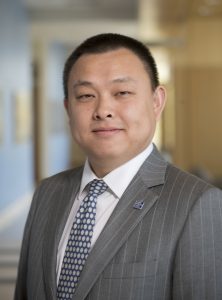Johns Hopkins UniversityEst. 1876
America’s First Research University

When Hao Yu, Bus ’12 (MBA), saw the brochure for the Carey Business School’s new full-time Global MBA program in 2010, he says it was one of “the best documents I’d ever read.” Johns Hopkins always stood out as the place to study for a career in medicine, and he saw the program as utilizing Hopkins’ strengths as a research institute through the lens of business. To be part of the charter class of Carey’s MBA degree on top of it felt like a once-in-a-lifetime opportunity.
Looking back on his time at Carey 10 years later, Yu believes he made the right decision. After graduating, he was offered a job at the International Finance Corporation (IFC), a sister organization of the World Bank. And after some years working in investments, he joined the biotechnology company QuanDx as CEO.
Yu credits his professional success to the experiential learning opportunities offered to him as a student at Carey. So when the chance came to work with the school to create a new way for students to learn from real-world scenarios, he jumped at it and now supports the Student Managed Investment Fund (SMIF).
We talked with Yu to learn more about the SMIF and his volunteer work with Johns Hopkins.
As a student at Carey, we had experiential learning opportunities that showed how the hardcore knowledge we learned in the classroom could help in the real world.
For example, in the Innovation for Humanity course, we went to a developing country and assisted a local business. I went to Rwanda, where we made great connections with local entrepreneurs and learned how different socioeconomic and cultural environments might create different priorities during the decision-making process. It broadened my understanding of the needs of different countries with different policies and different cultures.
The SMIF is an investment fund that is actively managed by current students and overseen by faculty. The students will pick the stocks or equity to invest in, and they will have to develop long-term strategies on what they believe will make positive changes to society while at the same time creating commercial value. It’s real people using real money to invest in real stocks.
Experiential learning is a very important tool for Carey students, and this fund will really add a lot of value to students in that capacity. It will showcase to potential employers that not only are we smart on paper, but we can show you how smart we are with actual results.
After graduating, one of my classmates nominated me to sit on the Dean’s Alumni Advisory Board (DAAB). It was a very good surprise and a dream come true. Not only could I successfully graduate and find a job that I enjoyed, but I also had this opportunity to make sure the students after me can have the same or an even better experience. And as I become more seasoned in my career, I have the resources to do more. So after serving my time on that board, I joined the Dean’s Advisory Council (DAC).
I have learned a lot from my fellow members on both the DAAB and DAC. They’re all successful professionals who have done great things in their careers and in their contributions to Carey. I see them as my role models. It’s been an amazing experience working with a bunch of smart, nice people, and we all have a great cause.
Once we graduate from a university, it becomes a part of us forever. So if you have confidence in your decision to come to Johns Hopkins, then you will want to invest in that choice by continuing to support the school.
Coming from China, where higher education is largely funded by the state, the idea of educational philanthropy isn’t a common thing. But I think giving back to the institution that changed your life or career feels good regardless of your cultural background. So if you feel proud of the degree you got from your school, I would encourage you to give back, whether it’s a gift or your time. You will feel wonderful while improving your university.
Topics: Alumni, Corporations, Carey Business School, Support Scholars